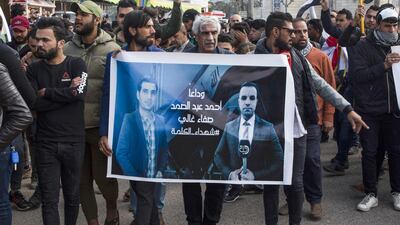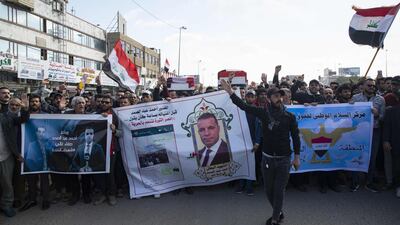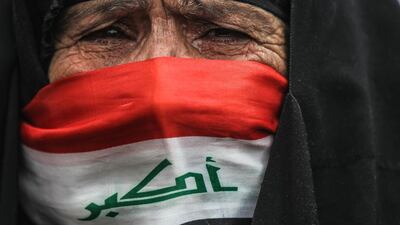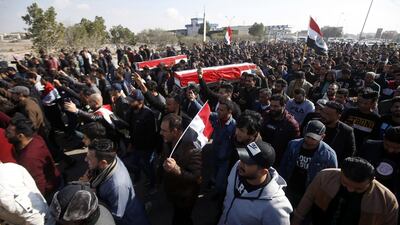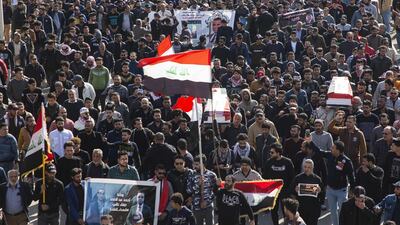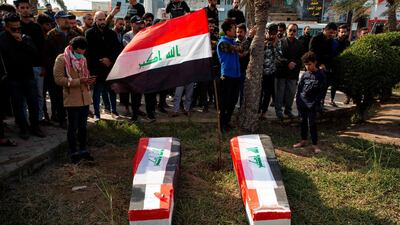Hundreds of Iraqis on Saturday mourned two reporters shot dead the previous evening in the country's southern city of Basra, where they had been covering months of anti-government protests.
Ahmad Abdul Samad , a 39-year-old correspondent for local television station Al Dijla, and his cameraman Safaa Ghali, 26, were killed late on Friday, the Journalistic Freedoms Observatory (JFO) said.
Mourners in Basra flooded the street holding aloft symbolic coffins and posters of the reporters.
“He was a journalist, a friend, close to us, we thought he was the voice of the truth, you can see how many protesters went to his house, in big numbers to stand against this,” said Mohamed Haseineyn, a civil activist from Basra.
Mr Haseineyn said, in the wake of Abdul Samad’s death, protesters felt anxious that further human rights abuses would follow.
“I'm afraid,” said Mr Haseineyn who has been working as a medic and activist throughout Basra’s protests, “I'm afraid as a civil activist, I'm afraid for our souls in Basra, I'm afraid for the rest of the journalists that publish true words.”
Unidentified men riding a motorcycle shot Abdul Samad and Ghali while they were in their car around shortly after they had wrapped up their coverage of Friday’s protests, reported the Gulf Center for Human Rights.
Abdul Samad was shot directly in the head and died immediately, while Ghali was shot three times through the chest and taken to hospital where he later died as a result of his injuries.
“He was known as one of the bravest journalists in the country and in Basra,” Nabil Jassim, a colleague of Abdul Samad and Ghali’s at Al Dijla.
Abdul Samad and Ghali spent their last day covering the crackdown on Iraq’s mass protests, documenting the arrests of demonstrators in Basra on Friday.
“When there were protests from the Iranian side, no one was arrested. When there were protests on the American embassy, no one was beaten. Why are there no arrests? Why do we have martyrs? Do you know who the third party is?” asked Abdul Samad ironically in the last video he published before he was killed.
Since the protests broke out at the beginning of October state actors have blamed much of the violence against demonstrators of an unknown “third party.” In his video Abdul Samad questioned why Iranian-backed protests did not receive the same crackdown as Iraq’s anti-corruption protests, heavily implying that the “third party” were Iranian-backed militia groups.
He was killed hours later, leading many to believe that militias may have wanted to silence the journalist.
“It [Abdul Samad’s death] is in their [militias] interests,” said Mr Haseineyn. “It's never in their interests that there is such a brave person who does not get afraid and who speaks the truth.”
Mr Haseineyn said that after Abdul Samad’s death, militias warned protesters not to blame them, claiming that his killing was an American conspiracy to delegitimise them.
Mr Haseineyn finds the claim ridiculous.
“The killing of Mr Ahmed is in the hands of the militias one hundred percent,” Mr Haseineyn said. “Without a conspiracy or the interference of anyone. Militias following, we all know who they follow, they follow Iran and kill every true word in Iraq.”
News of their deaths erupted through social media with grisly pictures of their bodies circulated on WhatsApp groups, Twitter and Facebook, causing outrage throughout Iraq.
In Baghdad, journalists held a gathering in solidarity with Abdul Samad and Ghali. Hadi Jalo, who works for the JFO and attended the gathering, doubted that there would be a proper investigation of the crime, based on previous similar incidents.
“The authorities will nor pursue those did the crime, and this is not the first of them, there have been 500 journalists killed in the past years since 2003,” he said. Iraq ranks 156 out 180 on the press freedom index, making it one of the least safe countries for journalists.
Mr Jalo explained that journalists across Iraq face incredible risks for doing their jobs.
"The situation is difficult for generally journalists in this economic and security situation...they cannot work in these security conditions," he said. "The authorities should responsible for the protection of journalists...as it should be any country."
“I personally always face threats and the journalism,” said Nabil Jassim, a colleague of Abdul Samad. “The environment in Iraq is one of the most dangerous environments, Iraq is one of the most dangerous places in the world for a journalist's life.”
Mr Jassim previously headed Al Dijla and now also works at the Rights Center for Freedom of Expression support. He explained that risks towards Iraqi journalists come from the weakness of the rule of law among other factors.
“There is weakness of the power of the law and the widespreadness of armed components,” he said. “The criminal gangs, the militias, and their control over elements of the Iraqi state, they govern Iraqi decisions and have power over the streets, all of these components put journalist's lives in danger in Iraq.”
